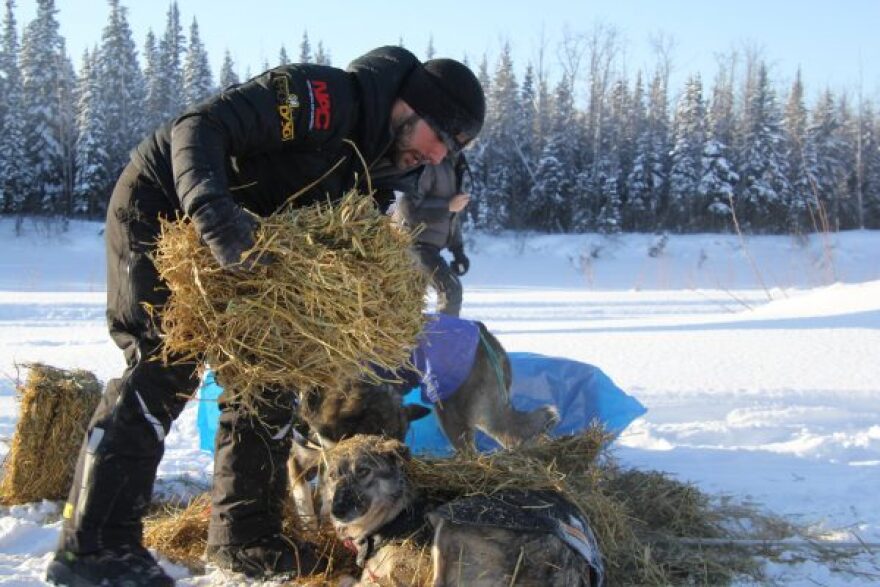Nikolai — Iditarod mushers streamed into the tiny village here throughout Tuesday, about 260 miles into the 1,000-mile race.
After remote lodges and shelter cabins, it’s the first checkpoint in an actual community on the trail, and the early mushers got a warm welcome, in spite of temperatures that plunged below zero degrees.
Richie Diehl was the first musher to pull off the Kuskokwim River and into the checkpoint at Nikolai on Tuesday morning. A veneer of frost covered his fur ruff and his dogs. He was met by a crowd of spectators, including children eager for teams to arrive.
As a prize for getting to Nikolai first, a local air carrier, Alaska Air Transit, gave Diehl a large, colorful Pendleton blanket, and two huge beaver mitts sewn by local elder Oline Petruska.
“She spent a lot of time and made them with love,” said Josie Owen with Alaska Air Transit, as she presented the prize.
“Cool, I just retired my other beaver mitts, so I’m glad they’re here,” Diehl said.
It was about negative 30 degrees on the river earlier in the morning, but the temperature steadily climbed with the sun, and great big stoves made of modified oil drums cranked out heat and steam as they warmed water for the mushers. It was the kind of windless cold morning that freezes the woodsmoke low in the air and makes each snowy footfall sound like a rusty door hinge.
Diehl described the trail from Rohn, the prior checkpoint, to here as good, mellow and chilly. He broke up the run with two hours of rest.
Similar to conditions leading up the Alaska Range, mushers who raced through the night said the trail crossing Rainy Pass, through the Buffalo Tunnels and across the Farewell Burn was in great condition.
“If it was like that every year it’d just be fun,” said Jessie Royer, the second musher into Nikolai, with happy looking dogs and high spirits.
The roughly 80-mile stretch from Rohn to Nikolai usually has has some of the worst trail conditions anywhere along the 1,000-mile route. There have been tree stumps, glare ice, gravel, dirt, overflow and the occasional ornery bison blocking the way. But, Royer said, not this year.
“I know, it’s kinda boring," she said. "But it was basically just a super nice run. Their booties are dry, no overflow, no open water, no dirt, no rocks. Just a lot of snow."
The normally hectic stretch was uneventful enough that Wade Marrs even caught some sleep.
“I’d sit down and pass out, then I’d stand up, and work, work, work, work, get warm, then I’d sit down and pass out. It’s a nice run for napping, it’s so flat,” he said.
Of course, those lulls can also turn into a liability. Travis Beals drifted off and got a painful wake-up call.
“I had fell asleep at one point, and went off the trail and slammed into some tree, and then it must have bent backwards and then it just clocked me right in the head,” he said.
It was startling, but not a major injury.
Most of the early mushers to Nikolai opted for a few hours rest here. The race continues up toward McGrath and Takotna, where a lot of racers opt to take their 24-hour mandatory rests.
Related: Follow all of our coverage of the 2020 Iditarod here.
By Tuesday evening, Royer had pulled into McGrath, the first musher to reach the checkpoint at mile 311. She received prizes handcrafted by residents: beaver and moose-hide mitts and a beaver hat. There had also been one scratch from the race. Jim Lanier dropped out of the competition at the Rainy Pass checkpoint out of concern for his own well-being, race officials said. At 79 years old, he was the oldest musher in the race.






